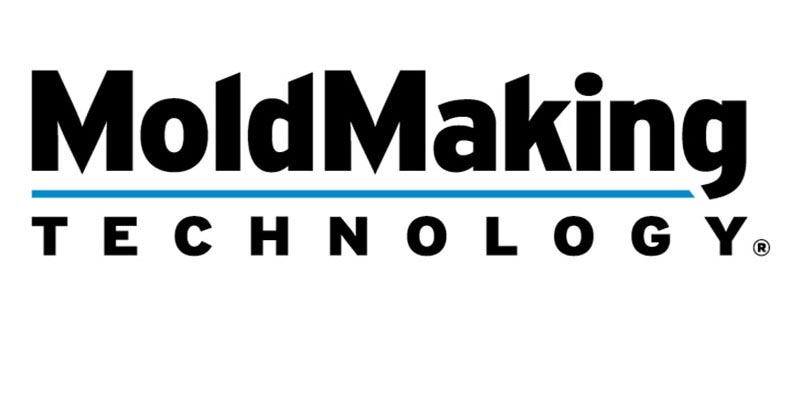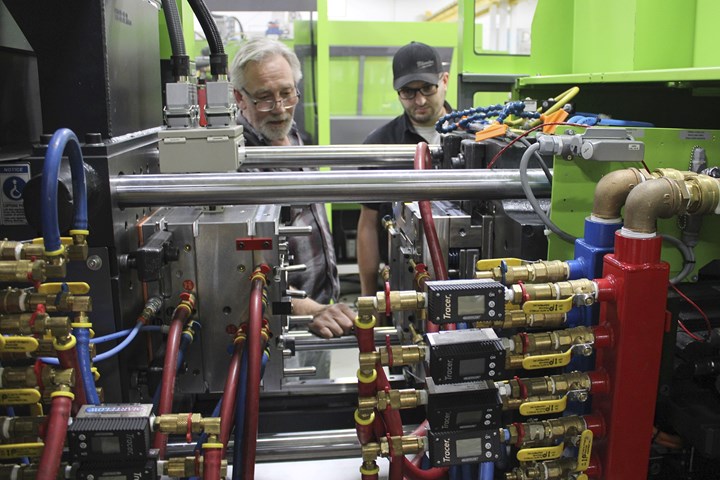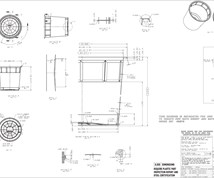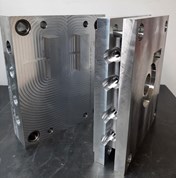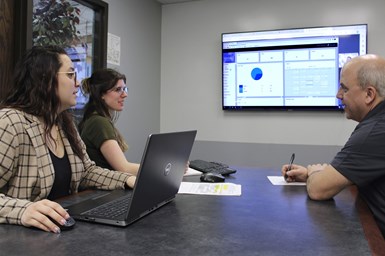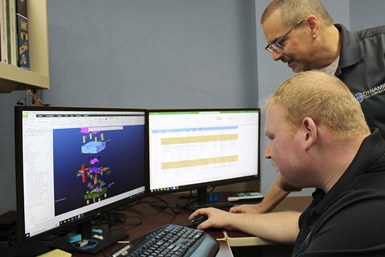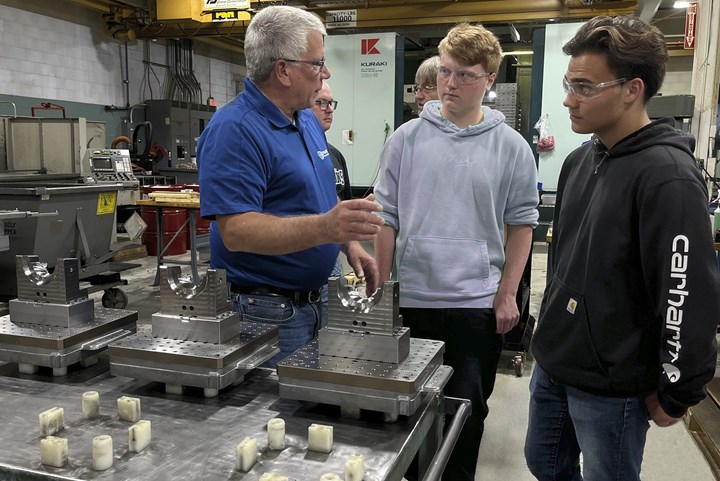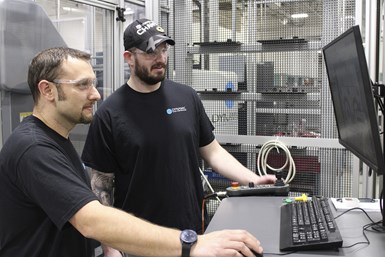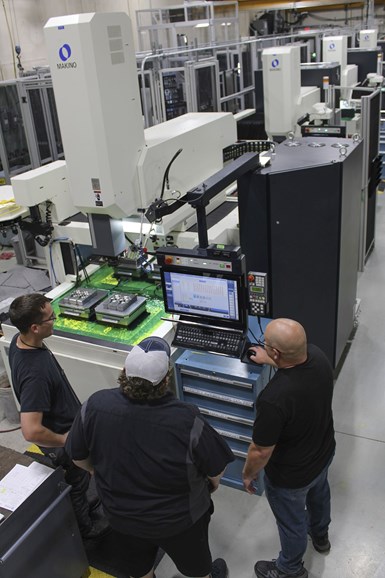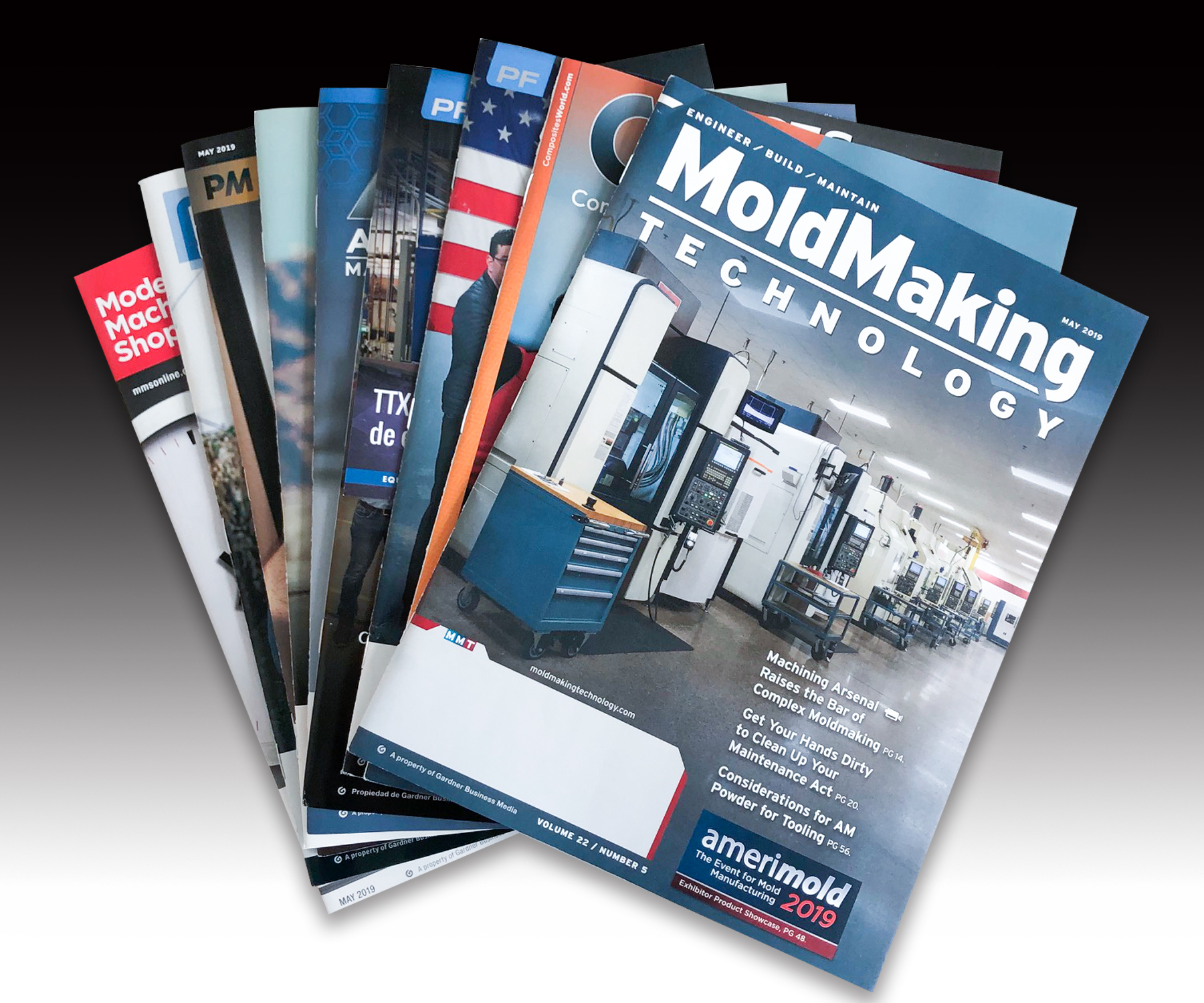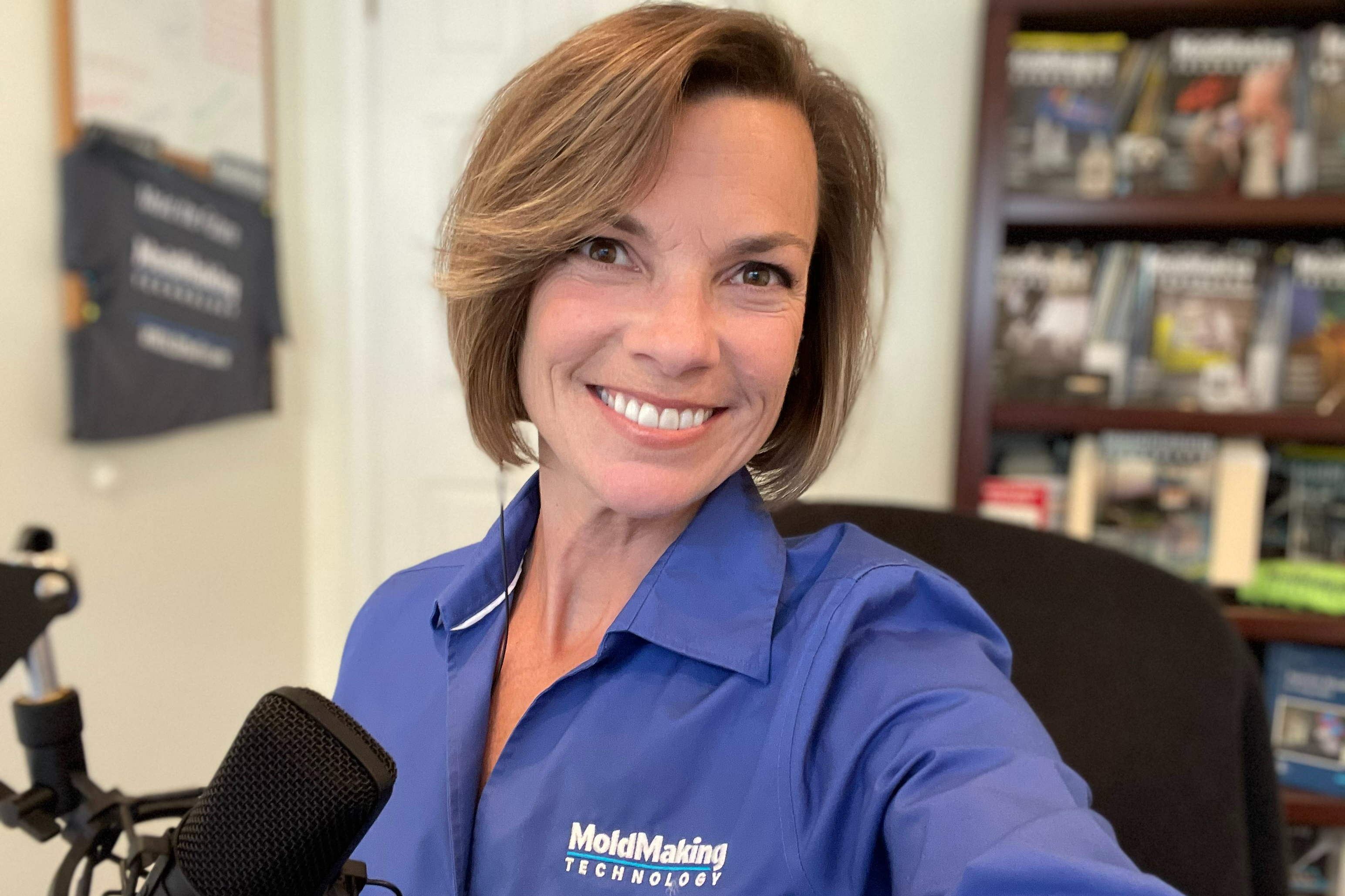Plastics Operations Manager Dave Hourihan understands the high expectations Dynamic Tool’s customers have. To that end, he teaches the benefit of a mold processing event as much more than a functional mold sample. “Our customers value the ability to closely replicate their production environment. A Dynamic sampling event is meticulously structured and documented and will employ complete thermal control at the projected cycle to help define the process corners. We will integrate fixtures, conveyors, robotics, inspection and assembly stations as required by the customer.” Photo Credit, all images: Dynamic Tool Corp.
It would be difficult to find a modern mold builder that does not tout their innovation prowess. Our customers need and expect innovative thinking from their moldmaking sources as they evolve and launch new products. The very definition of the word innovate is “to improve or replace something.” In our world of injection mold building, that usually translates into creating new methods and strategies to produce parts with shorter cycle times, thinner walls, multiple materials, no visible parting line, meticulous surface finishes, no gate vestige and complicated geometries requiring clever mold actions.
There isn’t a rule book we can reference when a customer presents engineering challenges. Instead, we must rely on our technical team’s experience, education and problem-solving abilities. Unfortunately, all three attributes come with a price tag of time — not just for the young toolmaker, designer or engineer, but their mentors. While classroom performance sets the foundation for continued education, it is the hands-on business environment where critical learning — and teaching — become important.
Featured Content
Continuous education isn’t relegated to machine centers and CAD screens. Dynamic’s Business Process Analyst Lauren Eberle and Sales Coordinator & Outreach Manager Cassidy Egan are shown attending an online quality management systems tutorial session with Operations Manager Jerry Wichman. Both Lauren and Cassidy have multiple responsibilities working with every department and group in the company. Lauren’s role has her leading the effort in Dynamic’s ISO-13485 certification process and managing the company’s documentation system, while Cassidy manages customer sales and quoting information and leads Dynamic’s recruiting effort.
The successful transition from school to the business world mandates a swift shift in perspective. In school, we operate with a safety net. If you miss assignments or perform at an unacceptable level, you fail. All you need to do is pay for more time at school. Those who write checks to the learning center carry the burden of failure.
When we fail in business, we risk burdening our company, customers and supply chain partners with cost and time overruns, which decidedly impacts reputation. A culture based on mentoring and education expedites the learning curve for the new toolmaker or designer. The wise and experienced set of eyes looking over their shoulder will circumvent catastrophic mistakes and avoid “learning it the hard way.”
“We evaluate for retention, understanding, follow-up, initiative, collaboration, reliability and attention to detail — none of which are skills. We can help them develop skills. The most critical factor of success is attitude.”
Building the Team That Delivers Innovation
How does a mold builder find candidates with the abilities to:
- Understand the ultimate design goals of the customer and vet each stage of engineering development.
- Identify and assess both the elements and the entirety of the project scope and deliverables.
- Successfully forecast both manual and machine hours, along with material needs and any special processes, to effectively quote the design, build and validation of the injection mold.
- Support and coordinate the activities of the shop and the customer through proactive communications.
Every single person who can consistently perform well in one or more of these areas is already gainfully employed — and likely coveted and reasonably compensated. We must constantly grow our team’s capabilities to truly innovate for our customers. So how do we get more of these experienced performers?
Strategy 1
Engineering Manager Todd Thull considers his role as a teacher every bit as important as his role as an engineer and designer. “Dynamic’s reputation is built on performance. It’s why our customers are loyal. We have the performance resources to enable their manufacturing success. Our strategic capabilities for the design of conformal cooling channels, our use of comprehensive process simulation to compare different design techniques and the tremendous tribal knowledge we have with auto-unscrew, auto-close, thin wall, insert and multishot molds provide efficient manufacturing solutions for our customers. One of the greatest perks of my job is my opportunity to pass along what I’ve learned and see it grow and evolve.”
One could pay to reach the experienced performers with an offer of employment by hiring a recruiting agency, placing ads on social media, industry publications and local job boards, hosting or participating in a career fair event and posting professionally made signs outside the facility.
Strategy 2
We can attract top designers, engineers and moldmakers through our reputation — our performance brand. This has nothing to do with the colors of a new logo or how many followers we have on social media. Instead, a performance brand is what people in our company, industry and community say about us when we are not there to hear.
Do employees brag about us to their family and friends? Are they proud and happy to work with us? Will our customers refer our services to colleagues, inside and outside their organization — will they endorse us when asked? Positive responses to these questions are only possible through consistent performance and a culture that enables growth, safety and fulfillment.
Strategy 3
Grow your talent through a well-structured, supported culture of mentoring and learning. Be a shop dedicated to mutual success where employees become colleagues who care about each other’s progress, happiness and safety, and where everyone is valued and shares in the company’s success, whether they are on the carpet or the concrete.
As the mold builder, our job is to extend and enhance that education so that continuous learning becomes part of the team’s DNA.
The Dynamic Way
Dynamic Tool Corp. has been a longtime participant and sponsor in the State of Wisconsin’s Apprenticeship Program and has made the necessary investment in personnel to support and guide the next generation. The primary responsibility of an approved sponsor is to provide on-the-job training to the apprentice under the supervision of skilled workers. For the moldmaker apprenticeship, the 10,400-hour learning activity (which includes 512 hours in the classroom) needs thousands of hours of support from the mentoring and administrative side of the shop. Several people will need to dedicate time to apprentice-related activities everyday to best serve the interests and future of the candidate and the company.
Student tours are a common event at Dynamic. “During the course of a year, we’ll host students and teachers from area grade schools, high schools, technical colleges and universities,” explains Plant Manager Scott Matenaer (with students from Kewaskum High School, above). “We like to keep the individual groups small, so we get a chance for interaction and discussion about what a career in our sector of manufacturing has to offer. Our whole team enjoys these opportunities — our toolmakers, designers, program managers, customer service. We have no shortage of tour guides.”
While the available pool of young technical talent in our industry is not nearly as deep as we all wish it were, we still must be selective in the personnel investments our companies make. At Dynamic, and very likely at your shop, every candidate for an apprenticeship (or any technical position) will be interviewed by both shop leadership and executive management. That’s because technical ability alone is not enough. World-class manufacturing and a progressive company culture require the appropriate attitude with aptitude.
We certainly seek solid technical prowess in a candidate, but we also appreciate and value the difference between confidence and arrogance. A toolmaker must possess a keen intellect and be self-reliant. In addition, they need to successfully manage projects or phases of projects involving hundreds of hours of personnel and equipment time and tens and hundreds of thousands of dollars in materials. These ongoing critical decisions are based on an appropriate level of homework and an understanding of the needs and available resources of the shop — requiring an individual with a mindset of active learning and collaboration, supported by the continued guidance of their mentors.
Advanced manufacturing technologies mandate advanced planning. Dynamic’s hard-cutting cell integrates three Makino V33 vertical machine centers, three Yasda jig borers, a Hexagon AB – Browne & Sharpe Global S CMM and a track-mounted custom Dynamic-built robot for workpiece management. Because a significant percentage of Dynamic’s work involves tight tolerances and repeatable, high-precision machining, the hard-cutters rarely get any vacation time. That means multiple projects running concurrently — and that means multiple toolmakers and CNC specialists communicating and collaborating to optimize production and ensure delivery targets are met.
Our young workforce is invariably made up of those individuals described as do-it-yourselfers. They are more inclined to the lathe and the mill than the spreadsheet or historical study. They want to make stuff and we want to teach and enable them to make it accurately and precisely. Dynamic is fortunate to have a remarkably supportive and manufacturing-friendly educational community in Wisconsin. Outstanding and progressive technical colleges and many high schools with a technical education focus and solid in-house resources provide the preliminary education to support careers in manufacturing. As the mold builder, our job is to extend and enhance that education so that continuous learning becomes part of the team’s DNA.
In the case of an apprentice, pre-apprentice or intern moldmaker, their initial workload is meant to acclimate them to the variety of processes in the shop that are required to produce the components, plates and bases of an injection mold. One of the most effective ways to learn how to build a mold is to take an existing one and disassemble it while evaluating and documenting each component. Opportunities for this activity are relatively frequent because many of the tooling systems built by Dynamic are high-speed/high-performance multicavity production molds. For many of our customers, we are their source for critical preventive maintenance, refurbishment and repair services, which provides our young workforce the chance to see the impact of real-world production molding on steel.
Mentoring requires a commitment of focused time. While everyone in the shop can act as a teacher of individual best practices, a good mentor tracks the entire scope of learning for the student. “We need time to train,” explains Plant Manager Scott Matenaer. “It is all about respecting the steel. From the start, we want our apprentices to get their hands on the steel and graphite (cleaning mold components and plates, mounting/dismounting electrodes), so they learn how to handle the materials we use effectively and safely.”
An example of the progressive and collaborative Dynamic mindset is the development and launch of this automated sinker EDM cell. The current roster integrates five EDM machines, four electrode carousels, five workpiece pallet racks, a CMM and a track-mounted robot. According to President Steve Eberle, “The Dynamic work environment is one that promotes, recognizes and rewards efforts to improve, as individuals and as a company. Our mission, put simply, is to inspire success for our customers and for each other. Our core values of performance excellence, integrity, safety and customer focus facilitate achievement and create an atmosphere of progressive learning and accomplishment.”
In the case of a starting Dynamic design engineer, one of the first tasks on their desk is to create a Mold Manual for the customer. This extensive document contains maintenance procedures and schedules, lubrication details, disassembly/assembly instructions, and visual documentation and identification of every component. This is a remarkably good way of learning about the business of developing and building injection molds.
“While it is an introductory project, the completion of a Mold Manual is an important and challenging one, needing absolute attention to detail and concentration,” Engineering Manager Todd Thull says. “The document represents the significant investment made by the customer and serves as a best practices guide for the injection mold’s proper care and management, so active oversight and guidance by the mentor is especially important.” Customer interaction will also become a platform for learning as the apprentice begins participation in preliminary customer meetings and design reviews.
Operations Manager Jerry Wichman adds, “It’s through the delegation of individual tasks and more involved projects where we can assess progress and determine which areas of their education need more time and support. We evaluate for retention, understanding, follow-up, initiative, collaboration, reliability and attention to detail — none of which are skills. We can help them develop skills. The most critical factor of success is attitude.”
“We’ve recognized and valued the culture of teaching and learning at Dynamic from the beginning,” says President Steve Eberle. “I benefited significantly from this environment when I began my career as an apprentice at Dynamic Tool. The knowledge I gained during my apprenticeship has served as the foundation I needed to become successful within the mold building industry. The growth and long-term success of our team, our customers and this industry depend on maintaining and expanding our mentoring and collaborative culture.”
RELATED CONTENT
-
MMT Chats: Global Tooling, Training and Motorcycle Trips
Adam Nartker dives into his 22-year plastics industry journey, covering custom molding, sales, and DTI’s approach to simulation iterations. He emphasizes transparency, training for risk reduction, and lessons from offshore tooling. Plus, he throws in some must-visit motorcycle trip spots!
-
Cross Training, In-House Capabilities and Collaborative Design Move Helm Tool Forward
Cross-training, bringing it all in-house, molding and collaborative design are essential to Helm Tool's success.
-
MMT Chats: Developing a Mold Engineering Apprenticeship Model
New mold design and 3D printing company wanted to partner with a local high school to train mold designers and a National Tooling & Machining Association Mold Design Group Apprenticeship was the answer. This episode is brought to you by ISCAR with New Ideas for Machining Intelligently.


